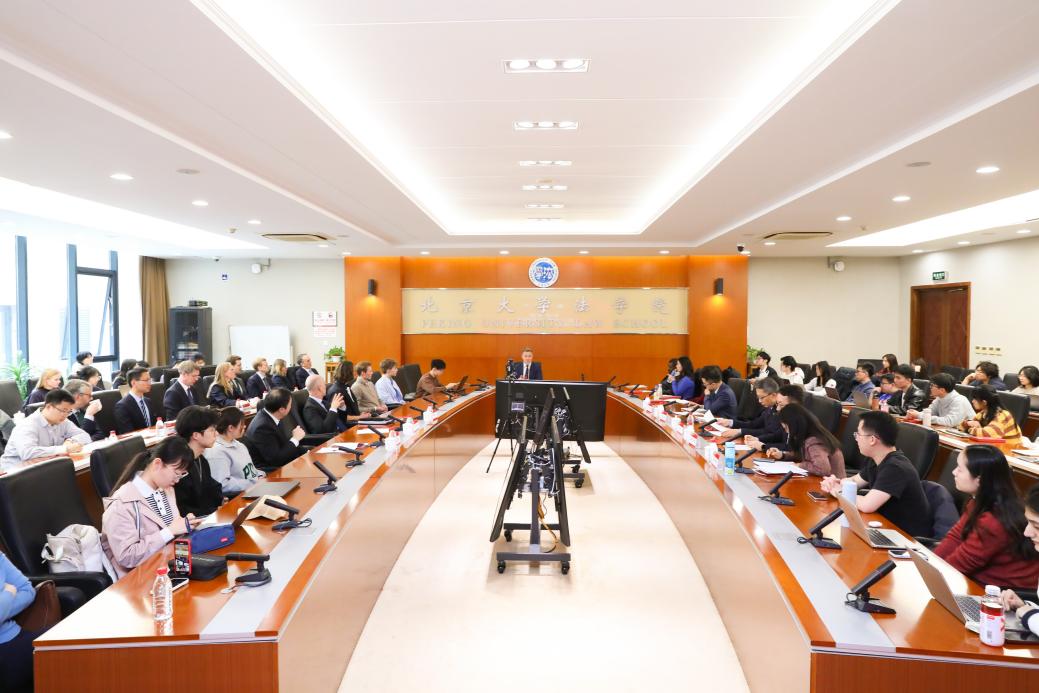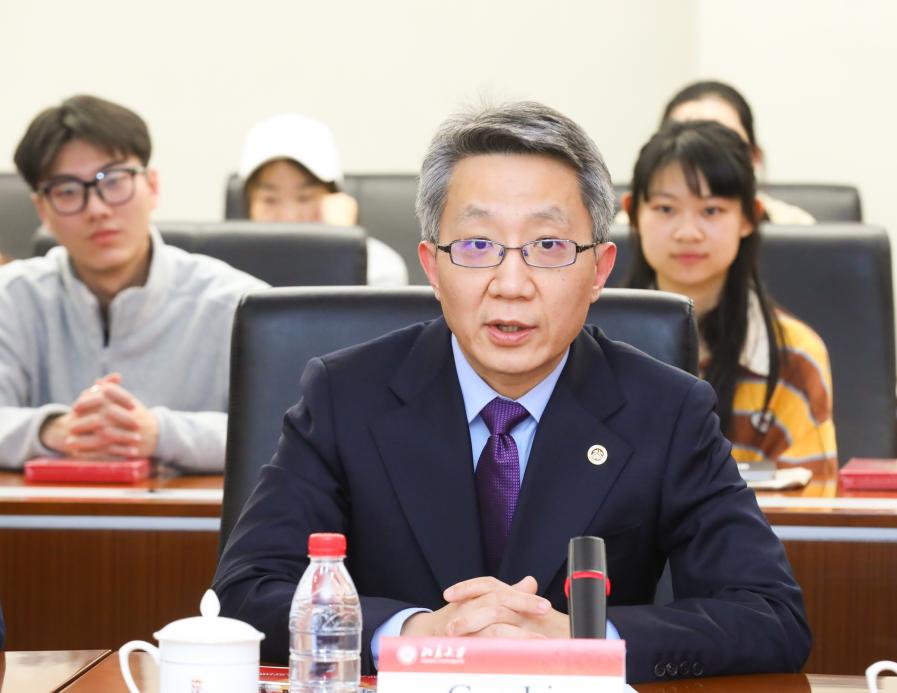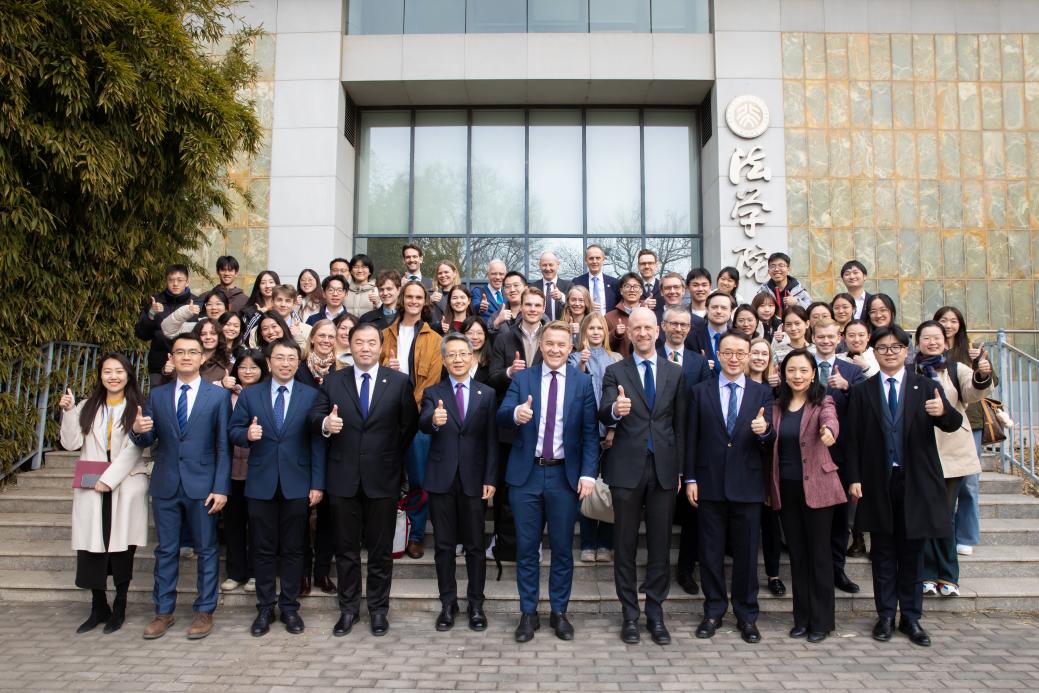State Secretary Kravik of the Norwegian Ministry of Foreign Affairs Visits Peking University Law School and Delivers Keynote Speech
Date:2025-03-18
On March 3, 2025, Andreas Motzfeldt Kravik, State Secretary of the Norwegian Ministry of Foreign Affairs, and his delegation visited the Peking University Law School and delivered a lecture entitled “Norway and the Law of the Sea”. Vebjørn Dysvik, the Norwegian Ambassador to China, and Liu Bo, Minister Counselor of the Department of European Affairs of the Ministry of Foreign Affairs of the People's Republic of China, accompanied the delegation. Guo Li, Dean of Peking University Law School, Dai Xin, Vice Dean of Peking University Law School, Zhang Kangle and Chen Xiaohang, Assistant Professors, Li Yuanyuan, Assistant Dean of Peking University Law School and Director of the Office of External Affairs, and more than 70 students and faculty members participated in the event, which was very well received.

Lecture site

Welcome Address by Guo Li, Dean of Peking University Law School
The following is the core of the presentation:
I. International law is very important in the conduct of international relations
In the current world situation, a series of cross-border conflicts and global challenges have made cross-regional and cross-border cooperation essential. To promote cross-regional cooperation, it is necessary to establish common norms and rules among countries. Therefore, we need a complete system of international law. At the same time, we must avoid double standards in the implementation of international law and ensure its integrity in a legitimate and credible manner; if we apply these norms selectively, the entire framework will lose its credibility and legitimacy, which could lead to the collapse of the entire system. In the United Nations Security Council, China has also consistently emphasized the framework of the United Nations and consistency in the implementation of international law. Norway's attitude is consistent with China's.
II. International law has been effective in dealing with international relations on the oceans and seas
Norway attaches importance to international law and its effectiveness as a whole, and in particular to the law of the sea, an area of international law that is closely related to Norway's own interests. Norway is a coastal State with the second longest coastline in the world. The United Nations Convention on the Law of the Sea is therefore a particularly important treaty for Norway.
There are 155 States and groups of States parties to UNCLOS, including 154 States and the EU. Even countries that have not formally acceded to the treaty act in accordance with it. This is because many of the provisions of UNCLOS constitute customary international law. In terms of content, the Convention is logical, hierarchical and detailed, and has been described as the “constitution of the oceans”.
One of the achievements of the United Nations Convention on the Law of the Sea is that it establishes jurisdiction over different maritime areas. It determines which countries have what rights in the exclusive economic zone, the territorial sea, the high seas and other maritime areas. It also establishes a dispute settlement mechanism centered on the Tribunal for the Law of the Sea.
III. Key issues related to the law of the sea
1. Arctic issues
In the Arctic, political and legal issues in the region are dealt with mainly through the Arctic Council. Norway is one of the eight members of the Arctic Council, and China is an observer in the Arctic Council. The Arctic region is not only concerned with economic issues such as shipping lanes and trade, but also with topics such as the environment and health. With territory in the Arctic and about 9% of the population living within the Arctic Circle, Arctic issues are also very important for Norway. In the Arctic, the continental shelves overlap, and this can also lead to potential disputes. The United Nations system, the United Nations Convention on the Law of the Sea and the Arctic Council are the basic framework for dealing with Arctic issues.
2. Climate change
In the past few years, a number of countries and groups have attempted to address the issue of climate change at the level of international law through international justice. The Tribunal for the Law of the Sea (ITLOS) also rendered an advisory opinion in 2024, incorporating climate change into the framework of the United Nations Convention on the Law of the Sea (UNCLOS). This demonstrates that the international law of the sea system remains highly relevant in addressing contemporary issues.

Lecture by Andreas Motzfeldt Kravik, State Secretary, Ministry of Foreign Affairs of Norway
Question Time
Prof. Zhang Kangle:
Question 1:
Around climate change, Norway has not only played an important role in the field of traditional international law, especially international environmental law, but has also made attempts in the field of green finance through its sovereign fund and so on. China is playing an important role in the field of green finance in the international arena. Can you share your views on the cross-cutting attempts in environment and finance?
Answer:
The Norwegian sovereign fund has set some restrictions that exclude areas of investment that are not in line with the values. For example, it will not invest in tobacco companies. In addition, there is an ethics committee that is responsible for providing guidance on actual investment decisions. Overall, financial markets, including sovereign funds, should also be an important way to promote green development.
Question 2:
You mentioned climate change and the advisory opinion issued by the International Tribunal for the Law of the Sea last year. At Peking University Law School, my students and I are also studying this topic, especially the practical legal effects of advisory opinions. The advisory opinion itself is not necessarily legally binding, and at the same time the United States, for example, a major carbon emitter, is not a party to the United Nations Convention on the Law of the Sea (UNCLOS). To what extent, therefore, can an advisory opinion issued within the UNCLOS system be effective in addressing climate change?
Answer:
Norway is relatively satisfied with the advisory opinion issued by UNCLOS 2024. There is of course the question of practical legal effects that you mentioned, especially the question of binding effect on States outside the UNCLOS framework. Indeed, this has been a major issue in the operation of the United Nations Tribunal for the Law of the Sea. However, it can be argued that this problem is less serious because most of the provisions of UNCLOS are customary law and are binding on all states and therefore should be binding on the United States.
It remains to be seen whether in reality the United States and other states not party to the convention will abide by these rules of obligation. For Norway, China and other parties to the convention, first we need to make sure that we are complying with these obligations and show everyone that we are complying with them and that we are consistent in our application of these rules; and second, if we see shortcomings, we need to have the courage and ability to point out those countries that are not. They need to hear from other countries.
Question 3:
We are living in an era of intensifying global problems such as increased regional conflicts and deteriorating environmental issues, while at the same time China's influence in global governance continues to rise. As a result more and more students are interested in international law. For students, there are two options: one is to enter the field of legal practice, such as foreign ministries and international organizations; the other is to engage in research. You have experience in two fields, namely academic research in international law and international legal practice, and then choose to engage in legal practice related to international law in governmental organizations. Based on your rich professional experience, what advice would you give to students interested in international law?
Answer:
My disciplinary background is in law, and I went to the United States for a period of time after graduating from university law school to study international law and international politics in depth. I wanted to be an academic but then wanted to get involved in practice and eventually chose to work in a government agency.
I think we need academics as well as international lawyers who are engaged in the practice of law, and at the same time the interaction between academics and practitioners is very important. I have observed that there is a good tradition in China that there are often law professors or people with academic backgrounds in diplomatic missions. I think Norway should also learn from such a tradition, because only then can more research and analysis be brought into practice.
Prof. Chen Xiaohang:
Question 1:
It seems to us that the Nordic countries excel in regional synergistic cooperation, especially in the field of marine and environmental protection, which is rare worldwide. Can you talk about how the Nordic countries' view of the law of the sea as a whole can help shape the future?
Answer:
The Nordic countries have a deep understanding of the importance of multilateralism, the importance of the United Nations, and in particular the UN Charter, which we see as essential to our national security, sovereignty and territorial integrity. At the same time, we all agree that international policy is almost equally important in relation to maritime issues, and in our bilateral exchanges, talks and discussions with other Nordic countries, we are well aware of the need to abide by the fundamental principles of the United Nations Charter and the international law of the sea system. Without clear rules to guide the interaction of States in the oceans and seas, we could easily slip into conflict and instability.
Indeed, the issue of the delimitation of the continental shelf has been successfully resolved through cooperation among the Arctic States, with consensus reached not only among the Nordic countries, but also with Russia. The continental shelf is rich in resources such as oil, gas and minerals, and ownership of the shelf means ownership of these resources, making the overlapping areas highly susceptible to conflict. Fortunately, the Arctic States are committed to resolving their differences and delineating the limits of the continental shelf in accordance with international law and through fair rules. This mechanism is essential to maintaining stability in the Arctic.
Question 2:
With regard to Norway's peaceful representation and the development of the double standard issue, as well as Norwegian peace and reconciliation diplomacy, can you give examples of how Norway has dealt with the double standard dilemma associated with these relationships?
Answer:
Peace and reconciliation and the avoidance of double standards have always been a key part of our foreign policy. Basically, this means that we try to lower the threshold for dialogue with other countries, especially those with whom we disagree, because we believe that dialog with these countries is the key to overcoming problems.
Sometimes we find that there is a tension between the three elements of international criminal law, peace and reconciliation. For example, if the International Criminal Court (ICC) indicts a leader, that will reduce the incentive for that leader to engage in peace and reconciliation, because if hostilities were to end, that person could go to prison. However, I think it is interesting to see where a suitable arrangement can be found among these tools to ensure that countries have flexibility in dealing with people who are involved in criminal behavior. As an example, we are a mediator between the Colombian government and the terrorist organization FARC. Colombia is part of the ICC, which means that they have a responsibility and an obligation to ensure accountability for international crimes; however, FARC has indicated that at the end of the process they will be sent to The Hague and incarcerated, so they are reluctant to be part of the process. There is a clear tension here. However, the ICC operates on the principle of complementarity, which means that states have an obligation to ensure accountability, and there is some flexibility within that obligation. Colombia's solution has been to ensure that there are accountability processes in place, but that individuals who come forward and recognize their actions and commit to a peaceful resolution of the conflict are given very lenient sentences.
We do our best to ensure that we are able to participate in mediating the various peace and reconciliation processes, while realizing our commitment to avoiding double standards in our foreign policy and to respecting our obligations as a member of the ICC and in international criminal law.

Group photo of all participants
The successful organization of this lecture not only provides valuable learning and exchange opportunities for teachers and students of Peking University Law School, but also injects new vitality into the exchange and cooperation between China and Norway in academic and humanities fields.



